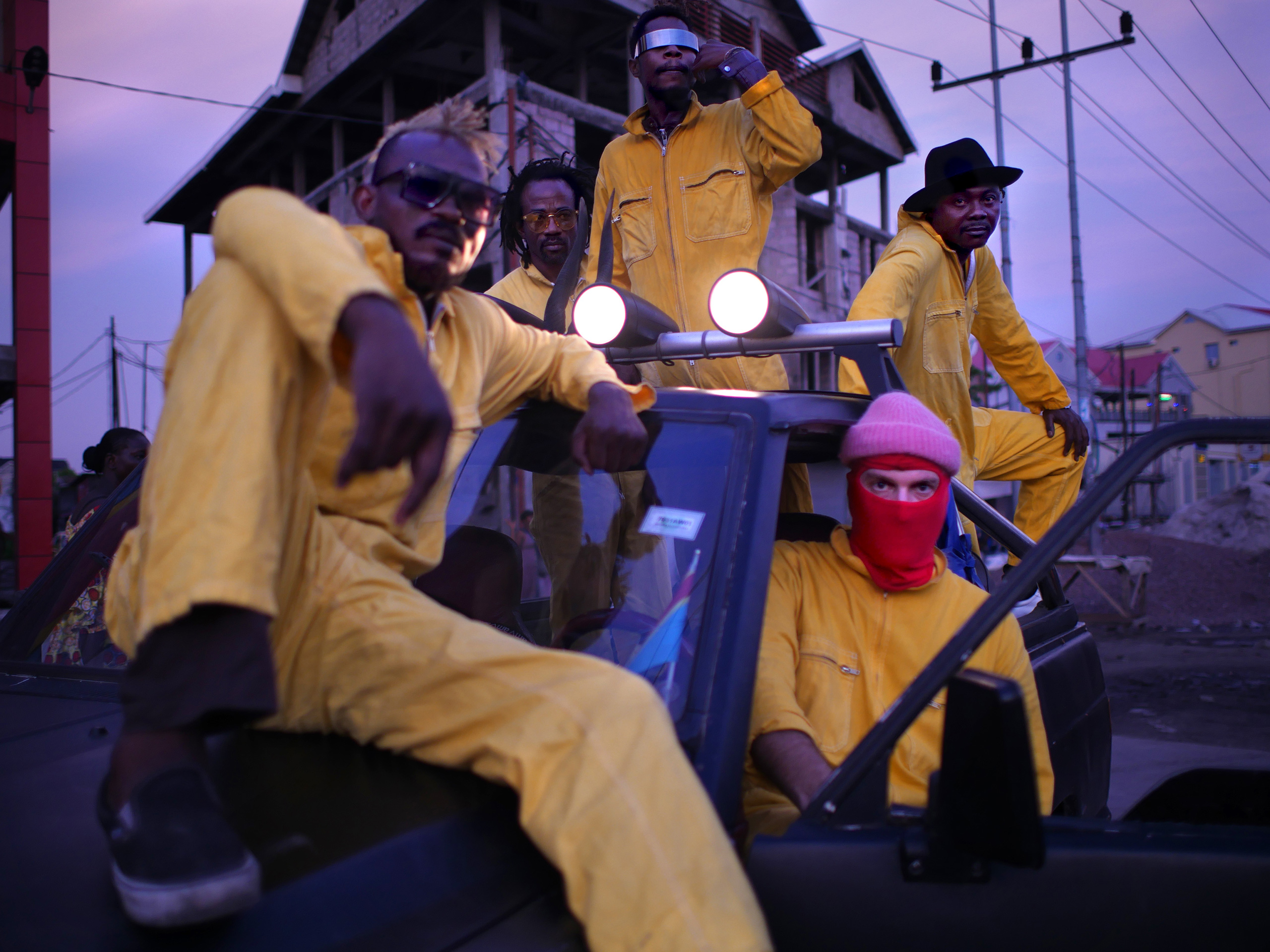The venture has culminated in a gloriously eccentric album, titled Fongola. Translated, it means ‘the key’, and KOKOKO! is a common phrase used in the Congo when banging on a door; the English equivalent would be ‘knock knock knock’, and the intention for the band is to unlock their sound; one that challenges not only Western standards, but also the parameters drawn for musicians domestically within the Congo. They want to bring their music to the people, regardless of where they might live. “To us, it feels important to represent a sound that is very different to what people associate with our country,” says Bianco, via Thomas’ translation. “I think most people think of the rumba, and that’s something that’s controlled almost like a mafia, because the big names have no interest in being yesterday’s sound. There’s a lot of pressures in Kinshasa if you want to come with a new sound – it’s a bit tricky.”
The fact that KOKOKO! feel stifled in their homeland – the same place that has given forth to them this absurd, but brilliant blend of dance, techno and more besides – does at least mean that they feel much more comfortable overseas, now that they’ve had the opportunity to bed themselves in. “Abroad, there are no barriers, and no expectations,” adds Bomolo. “In the Congo, there are more than 400 languages spoken. We want to represent that when we play to people. We want them to understand our country’s diversity.”
It’s a mantle that they’re happy to take on, and one that they’ve been fulfilling with considerable aplomb; here in the UK, they’re in the thick of a slew of festival dates that will also take them to mainland Europe, and they’ve been bestowed with the ultimate seal of alternative approval – being playlisted by 6 Music. It doesn’t, though, mean that the process of making Fongola was similarly easy, similarly straightforward. “It was really tough,” Thomas admits. “We didn’t have a studio, at least to begin with. When I first got to Kinshasa, I didn’t know who was a player and who wasn’t. We were working in this enormous compound, full of performance artists, and It was so loud! There’s some great early recordings, but they’re unusable, because there’s so much going on in the background. Eventually, we managed to knock together a small studio within that place, just to isolate the sound, but I wasn’t working under conditions I was used to. You have to remember, these instruments are incredibly loud – that in itself throws up a real challenge!”
Fongola came together, in the main, over the course of the first two trips that Thomas took to Kinshasa; he was getting the feel of his new colleagues all the while, and in between the two excursions he tinkered with the recordings back in Brussels. What that layover also gave him time to contemplate was where the lyrics were coming from; KOKOKO! are joyous by nature, but at no point did that mean that they had nothing meaningful to say. “There’s a few different topics on there,” he says. “There’s the sounds and the street life of Kinshasa, but there’s also a couple of songs about the ancestors, and then another two that are just party tracks, designed to get people dancing.”
All of this sounds markedly unpolitical. “That’s not the case,” says Thomas. “There are songs on there that are really about politics, but they’re disguised, because it dangerous to talk about that. They’ll say something, and it’ll sound naive, but the audience understands.” There are references, he says, to the perpetually-delayed presidential election in the Congo. It’s not just that Fongola represents the opportunity for African music to permeate a market that has not traditionally been friendly towards it; it’s also that it carries with it a summation of the day-to-day state of present central Africa.
And yet, that leads KOKOKO! to what might be their crucial dilemma in our corner of the world: how do you categorise a band that so vigorously throws so many different ideas into the same pot? “That’s so hard!” says Thomas. “We’ve tired to steer away from people calling it ‘world music’. It’s not like we’d call anything ‘European music’, is it? We all have our own names for it. Makara has a name for his own style, and Boms thinks that everything he makes is his own take on techno! There’s no way to make it easy for websites or record shops. Sometimes we’re dance, and sometimes we’re not.”
